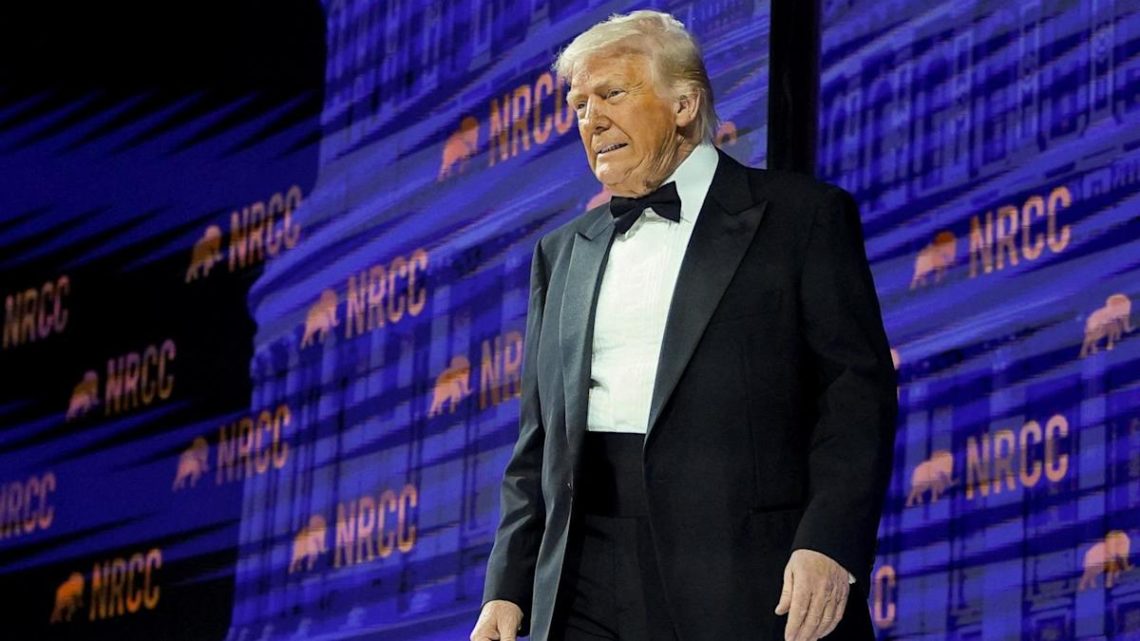At a political fundraising dinner on Tuesday night, President Donald Trump said he plans to announce tariffs on pharmaceuticals soon.
“We’re going to tariff our pharmaceuticals, and once we do that, they come rushing back into our country, because we’re the big market,” Trump said at the National Republican Congressional Committee dinner in Washington, D.C.
“And when they hear that, they will leave China, they will leave other places, because … most of their product is sold here, and they’re going to be opening up their plants all over the place in our country — we’re going to be announcing that,” he continued.
Although Trump recently implemented a 90-day pause on some tariffs, he said Wednesday he’s still serious about putting tariffs on pharmaceuticals to boost U.S. drug manufacturing. “We’re going to put tariffs on the pharmaceutical companies, and they’re going to all want to come back,” Trump said, speaking from the Oval Office.
MORE: Drug shortages hit record high, pharmacists warn
The raw ingredients of almost all medications are made overseas, even for drugs that are manufactured in the U.S., meaning tariffs could drive up the costs of several medications including over-the-counter painkillers as well as antibiotics, heart medications and asthma drugs.
Pharmacy and economics experts said such tariffs could also lead to drug shortages and could even potentially stall research and development.
Added costs
Experts say any added costs would be passed onto the consumer.
Ernie Tedeschi, director of economics at The Budget Lab at Yale, a nonpartisan policy research center, told ABC News that the average household spent an average of $4,200 on prescription drugs in 2024. That figure includes a combination of out-of-pocket costs and spending covered by insurance.
Tedeschi said an assessment from The Budget Lab found that a tariff of 25%, for example, would raise pharmaceutical prices by 15% on average.
“Based on our assessment … costs for prescription drugs would rise by an average of around $600 per year per household in the United States,” he said. “Now, not all of that would necessarily be out-of-pocket for the average family … but if a family is not paying that full $600, their insurance company is paying the other part of it.”
He went on, “So even if families don’t see a price increase that they are responsible for, they may end up paying higher insurance premiums [and] higher co-pays as a result of this.”
MORE: Drug shortage can put patients’ lives at risk, experts warn
Drug shortages
Tariffs could also impact generic drug makers operating on thin margins, according to Dr. Erin Fox, associate chief pharmacy officer at University of Utah Health who tracks drug shortages.
Specifically, Fox told ABC News she is worried about drugs that are already often in shortage, including injectable medications. This includes drugs like lidocaine, which is used to numb pain.
She said medicines that people take every day, usually in pill form, are less likely to be likely not going to be as impacted in the near term because there are many suppliers of those products.
“An injectable product might only have two or three [suppliers] max,” she said.
Fox said most generic companies have six- to 12-month supply of their active pharmaceutical ingredients on hand, and some companies may have bought some extra products in anticipation of these tariffs.
“This isn’t going to be an immediate effect, necessarily, that we’re going to see, but when it comes time to buy that next batch of raw materials, will it have a high tariff, and will the company be able to afford to do that?” Fox said.
Less research and development
Dr. William Padula, an assistant professor of health policy and economy at the University of Southern California and a scholar at the USC Schaeffer Institute, said he doesn’t believe the tariffs will have a major impact on consumers but could impact the research and development areas of pharmaceutical companies.
He explained that pharmaceutical companies don’t just make drugs but other tools including vaccines, biomedical products and even over-the-counter products, such as bandages.
MORE: Popular weight loss drugs in tight supply as Zepbound shortage could last through June
Padula added that these companies use their profits in different ways including investing in research and development.
“If they have less research and development money because fewer people are buying drugs that are priced higher as a result of tariffs then, over the long run, they’re going to have to withdraw investments in research and development that could lead to fewer innovations,” he told ABC News.
“As a result, we [could] end up in a situation where there aren’t as many novel, new treatments for patients with different diseases,” he added.
ABC News’ Sony Salzman contributed to this report.
Trump’s proposed pharmaceutical tariffs could drive up costs, lead to drug shortages: Experts originally appeared on abcnews.go.com
The post Trump’s proposed pharmaceutical tariffs could drive up costs, lead to drug shortages: Experts appeared first on ABC News.




